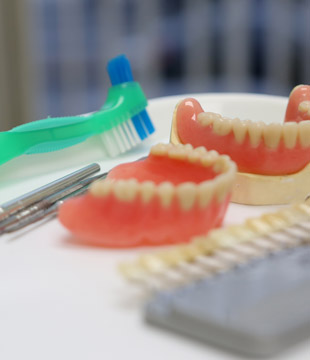At Denture Clinic
There's one thing you won't see at a denture clinic — it is anxious patients in a waiting room in anticipation of dental procedures. And for a good reason. Denturist's scope of practice is non-invasive when it comes to clinical procedures. This article will set some expectations for your next visit to a denturist.
The reason to call a denturist is predominantly a simple one — I'm missing teeth and I need to replace them. Here's a trivial fact — the human digestive system starts with an oral cavity carrying an evolutionary chewing system. It's also not a mystery that when the function of any part of the digestive system is damaged or dysfunctions, the organism as a whole will suffer. Take it for granted or not, having something to chew with makes a difference when it comes to nutrition and enjoying delicious tastes this world has to offer. I doubt there's a need to convince anyone they need teeth, so let's move on.
At the office, you'll meet a denturist. You might have spoken with a receptionist, but once you're in the office, your denturist will be taking care of you past the waiting room. The clinical room carries a dental chair, the main piece of equipment that will stand out and identify this room. This room will be used for the first examination and consecutive try-in appointments. Surprisingly, most of the time here, especially on the first appointment, will be spent talking and laying out individual treatment options.
Nearly every establishment has a back office. In a restaurant it's a kitchen where taste is created, at the grocery store it's a warehouse with on-the-clock delivery, and at denturist, it's a lab where dentures are fabricated. This is a rather peculiar area, especially for folks like myself who always wonder when looking at strange tech devices. When it comes to dentures, technical labs vary depending on the number of denturists, load, and specialty. Regardless of specialty, a typical denturist's lab is equipped to fabricate, repair, and reline acrylic dentures, whether it's partial or complete. Some dentures also require cast metal parts, like clasps, cast denture base, etc. These parts require special equipment that can melt, cast, and polish metal to custom shapes using various biocompatible metal alloys. These parts sometimes manufactured in a different lab that specializes in working with metals.
One thing you'll notice when visiting certain denture offices is limited working days or a sign "by appointments only" on certain days. This certainly got me curious, — "they must be doing well if they can afford to work three days a week", — I thought when first noticed. Turns out there was a different reason for this. As denturists are responsible for establishing a treatment plan and guiding you through the process, they are also often the ones who do the laboratory work. Yes, the one with wax, acrylic, plaster of Paris; Laying out denture arches with meticulous eye using obscure devices purpose of which only they know. In fact, when fabricating a denture, denturists will spend most of the time in the lab. That explains strange work hours — they need to spend some time in the zone doing technical work.
When it comes to choosing a local denture practice, I can only offer opinions, because there's no one answer to rule them all. So here're a few tips. Reputation is the first thing you should evaluate. Professional services usually well integrated with communities. Perhaps you've heard a recommendation from a friend or family member. Some practices are also active online, in which case you'll sure to find some feedback and recommendations right in your browser, and will be able to match and choose.
The second tip is to research their final work. Most of the craft is in the technical work, so no matter what those reviews say about interpersonal skills, the final product you'll walk out and want to be happy with are dentures and those are created in the lab. It can be difficult to evaluate the level of laboratory expertise, but it doesn't hurt to ask to see samples or case studies of their work if they have it handy, whether it's in a form of a spare denture to highlight the technical work or pictures of cases they did. Either way, it should give you some idea of whether they can satisfy your needs and wishes.
My final tip is to pay attention to the ease of reach. That means how easy it is to get an appointment with them and come into the office, should you need an adjustment or a quick repair. Evaluate your abilities when it comes to commute, but also make sure they are available for quick repairs when you need them.
Receiving your new dentures. Here comes the day you receive your final dentures, full of anticipation, perhaps you already know the restaurant you'll have dinner tonight. Your denturist will hand over a nice tray and give instructions on how to maintain the set. He or she will also mention that you might need to come in for an adjustment when and if necessary. This is highly individual and does not correlate to the level quality until given some time, usually from two to four weeks. From this time forward, the recommended time to visit your denturist is yearly to make sure your dentures fit you well and do reline or adjustment if necessary.
This pretty much concludes our visit to a denturist office. Have a wonderful day and smile freely.


